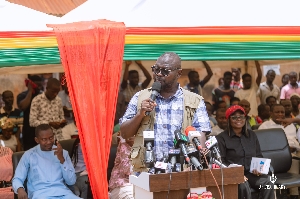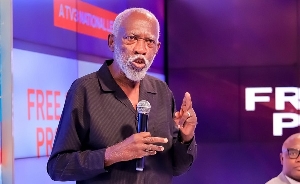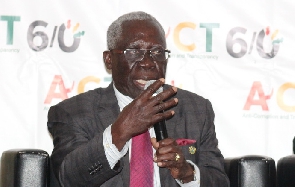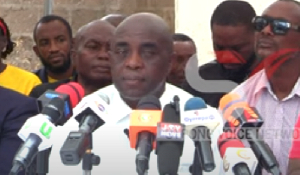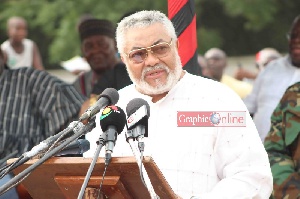 J. J. Rawlings retired from the military and bizarrely metamorphosed into civilian president
J. J. Rawlings retired from the military and bizarrely metamorphosed into civilian president
The phraseology-political tradition is used as a descriptive label for a set of ideas and values about political parties in a democratic dispensation. Political tradition, therefore, comprises the body of ideas that undergird the conduct of political parties.
In Ghana, the widely recognised and dominant political traditions are the ‘Nkrumaists’ and the Danquah-Dombo-Busia.
It is however worthy of note that the first political party formed in Ghana was the United Gold Coast Convention (UGCC), which was formed on 4th August 1947.
Back then, according to the available historical facts, the organisers magnanimously extended an invitation to the equally intrepid and patriotic Dr Nkrumah in London to take an important position as the secretary of the organisation.
To his credit, though, Dr Nkrumah graciously obliged and took the position. But as it is with any other working team, unexpected dissonance ensued and the members unfortunately parted ways.
Consequently, Dr Nkrumah, together with a few disgruntled UGCC apologists broke away and formed the Convention Peoples Party (CPP).
And the other remaining members of the UGCC formed a new party which was called the United Party (UP).
Based on the rich history of the Nkrumaists and the Danquah-Dombo-Busia traditions, the party faithful have bragging rights about the authenticity of their respective ideologies.
Bizarrely, though, the supporters of the New Democratic Congress (NDC), a party that sprung out of a series of coup d’états have been parasitically holding on to the Nkrumaists tradition.
That could not be right because as far as Ghanaians are concerned, the NDC Party was founded on the ideals of coup makers, who had not spelled out ideology back then.
Perhaps, the brassbound NDC Party supporters are not content with their tempestuous and weird tradition, hence seeking refuge in the Nkrumaists tradition.
As a matter of fact, Ghana’s revolution days under the founders of the NDC Party could be likened to: “in the China of “the Great Helmsman,” Kim Il Sung’s Korea, Vietnam under “Uncle Ho” and Cuba under Castro, Ethiopia under Mengistu, Angola under Neto, and Afghanistan under Najibullah”.
Apparently, the NDC Party apparatchiks have over the years been hoodwinking and proselytising unsuspecting Ghanaians to believe that the NDC Party is a subsidiary of the Nkrumaists tradition.
The fact however is, the NDC Party was founded on the ideals of coup making enthusiasts.
And given the circumstances in which the NDC Party was formed, one would have expected a true probity, transparency and accountability within the elected NDC government, nonetheless that has never been the case.
The fact is, since the attainment of the independence from the British in 1957, the NDC tradition (PNDC and NDC) had governed the country more than any other government I can think of. In fact, that tradition had governed Ghana for approximately 27 years out of Ghana’s 60 years.
The CPP tradition (CPP and PNP) governed the country for approximately 12 years.
Disappointingly, the last ‘Nkrumaists’ government formed by the PNP, and led by Dr Hilla Limann, was deposed by the founders of the NDC Party which was spearheaded by Ex-President J. J. Rawlings on 31st December 1981.
The military regimes of the NLC, SMC 1 and 2 ruled Ghana for about 10 years before the founders of the NDC supplanted power on 4th June 1979.
The UP tradition (PP and NPP) total share of the day-to-day management of the country is about 11 years to date.
In my humble opinion, in terms of useful infrastructural projects which put the country at a substantial and propitious position, Dr Nkrumah’s CPP government did exceedingly better than any of the administrations that followed.
“Although Prime Minister Kofi Abrefa Busia’s government lasted for less than three years, there is no community in Ghana where traces of his development initiatives cannot be seen.
“Notable achievements of Busia's government include the building of roads, housing, provision of healthcare facilities and water.
“Dr. Busia was the first Ghanaian leader to establish a ministry responsible for rural development, a move, which was in line with his commitment at raising the living standards of the rural dwellers (Daily Guide, 11/07/2013).”
Generally, I detest coup makers, but General I. K. Acheampong (The Head of State from 1972-78) was an exception to my odiousness. I had a great deal of respect for the man, primarily because of his great sense of foresight.
In my humble opinion, General I. K. Acheampong was an estimable leader who initiated pragmatic policies such as operation feed yourself and affordable housing units.
“The Limann government assumed office at a time when the economy was stagnant; all credit lines to the country had gradually dried up and were finally blocked due to brutalities and confiscations at the harbours and other points of entry into Ghana.
“Through very careful negotiations, preparations and honest presentation of well thought-out programmes, government worked out a pragmatic approach to the solution of our economic problems.
“Laudable efforts were made to repay our short-term debts and demonstrated the ability to meet our debt obligations.
“DrLimann’s government was able, within 18 months, to restore virtually all traditional credit lines” (Source: PNC).
Disappointingly, however, Rawlings and his cohorts did not give Dr Liman and his PNP government the breathing space to govern the country, as they relentlessly breathed down the neck of President Liman.
As a matter of fact, Rawlings and his conspiratorial plotters unfairly kept criticising Dr Limann’s administration for what the coup makers perceived as economic mismanagement, until Rawlings and his jailbreaking geezers decided to depose Dr Limann.
Subsequently, J. J. Rawlings and the other obstreperous jailbreakers took arms and succeeded in deposing the democratically elected government of Dr Hilla Limann on 31st December 1981.
Apparently, Rawlings and his friends formed a government which they called the Provisional national Defence Council (PNDC) and appointed Rawlings as the chairman.
After imposing himself and despotically ruling the country for over 11 years, J. J. Rawlings retired from the military and bizarrely metamorphosed into civilian president on the ticket of the New Democratic Congress in 1992.
- The black man is capable
- We will scrap Founders’ Day when we come to power - NDC
- Ghana must take stock of progress - KNII
- It's misleading to tell children an individual gained independence for Ghana - Mike Oquaye
- Our independence was the outcome of pluralistic efforts and collective wisdom - Prof. Oquaye
- Read all related articles

